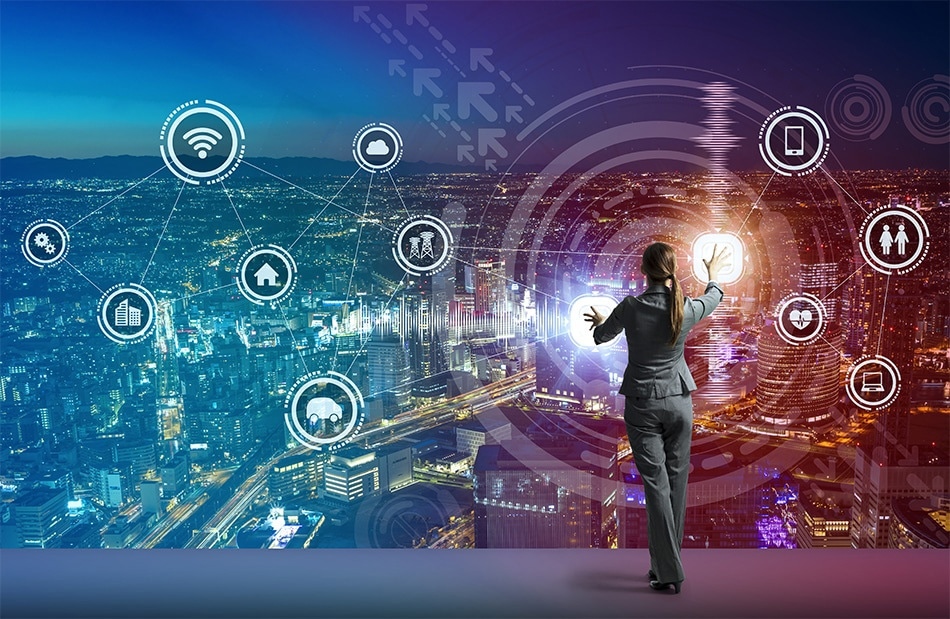This article was updated on the 4th September 2019.

The possible future implications and uses of sensor technology are limitless. Several research projects are currently looking at ways to control this technology for purposes such as enhancing the performance of energy sources like solar-powered batteries and fuel cells, improving the capability of these systems to monitor health, safety and security, as well as a potential use for environmental monitoring1.
Furthermore, futuristic intelligent systems are looking into incorporating sensor technology to recognize visual, tactile, olfactory, audiological and physical senses.
Sensors can execute each of these functions through their transducer ability, which relies upon the application of electrical or optical signals to induce a response by the system2. Through the conversion of various types of physical phenomena into measurable data, sensors often exhibit accurate, reliable, efficient and robust capabilities that allow this technology to be used in an increasing number of industries around the world.
The application of sensor technology can be found in almost every aspect of our daily lives, including safety, security, monitoring, awareness and surveillance products. As a technology that can be utilized in both micro and nano-settings, sensor technology systems have found a particularly useful implementation within the field of medicine as a diagnostics and drug monitoring tool that has enhanced critical care for patients1.
To be able to quantify the global market for sensor technology, BCC Research has released a report on the current and future applications of sensor technology around the world. The main purpose of this study was to understand the rate of growth that sensor technology is expected to have, while also providing prospective manufacturers, distributors and users of the technology with information on the potential opportunities sensor technology may offer for their future endeavors.
The study conducted a review of the function and history of the applications of sensors since their introduction into society. Then, the overall market size was quantified and analyzed, and the revenue estimates from the total market were achieved by collecting data from engineers, marketing executives, product sales engineers, international sales managers and other necessary personnel of sensor companies. Based on the results of this review, it is estimated that the global market for sensors will rise from $110.4 billion in 2015 to an anticipated $240.3 billion in 2023.
Smart sensor technology is looking to revolutionize the future of the world within the next few years. Compared to a typical sensor, smart sensors are equipped with a microprocessor capable of customizing outputs and providing interpretive data that significantly improves the capability and performance of the sensor system3. By ensuring the integrity and reliability of the data collected by the smart sensor, its application in medicine, consumer products, communication devices, home sensors, transportation and military is inevitable.
One example of how smart sensor technology is already advancing the field of diagnostic medicine is clear from the PillCam Capsule Endoscopy; a device that has been developed by the Israeli company Given Imaging and is changing how the human intestinal tract is studied. The PillCam is an ingestible pill-sized camera that allows physicians to gain visual access to the insides of the esophagus, small bowel and colon. This procedure is useful as it eliminates the need for patient sedation and invasive endoscopic procedures that are traditionally used for such investigative purposes4.
Within the communications industry, current smartphones are equipped with several sensors such as a microphone, camera, digital compass, accelerometer and gyroscope; however, the future of smartphones is expected to contain even more sensors. Among the recently considered futuristic sensors are those such as barometers and accelerometers that are used to study the activity of the user. Some researchers are studying how specific sensors can be applied to smartphones to detect the ambient pollution present in the surrounding environment4. Researchers estimate that by the year 2050, smart sensors and similar sensor-based systems will be part of the majority of the work performed by all industries.
The future of both traditional and smart sensor application is incredible. Current research trends are anticipating that “smart cities” are on the rise. Defined as cities that are either in the process of or have already employed various information, communication and technology solutions across three or more functional areas of the city, smart cities offer a resolution to the massive global urbanization that is already taking place6.
A United Nations report has recently postulated that by the year 2050, 66% of the world’s population is estimated to live in cities, which will also lead to an overall population growth of 2.5 billion people6. One way to handle such an exponential growth is through the implementation of smart cities. The ability to monitor the activity of millions of people, adequately managing and improving the efficiency of a city’s assets and services, can meet the population needs at an impressive rate. Cities around the world such as Montreal, Quebec in Canada, San Jose, California in the United States and Wuhan, China are already confirming the benefits of these types of smart sensor systems.
References:
- "Sensor Technology and Applications." The Electrochemical Society. Web. http://www.electrochem.org/world-of-sensors.
- "Global Markets and Technologies for Sensors." PR Newswire. Cision, 27 Mar. 2017. Web. http://www.prnewswire.com/news-releases/global-markets-and-technologies-for-sensors-300430105.html.
- "Global Markets and Technologies for Sensors." ReportBuyer.
- "How Smart Sensor Systems Will Revolutionise the Future." Appcessories. 5 Jan. 2016. Web. http://www.appcessories.co.uk/how-smart-sensor-systems-will-revolutionise-the-future/.
- "PillCam Capsule Endoscopy." Given Imaging.
- "The Future of Smart Cities and Sensors." Advanced MP Technology. Web.
- Image Credit: Shutterstock.com/chombosan
Disclaimer: The views expressed here are those of the author expressed in their private capacity and do not necessarily represent the views of AZoM.com Limited T/A AZoNetwork the owner and operator of this website. This disclaimer forms part of the Terms and conditions of use of this website.